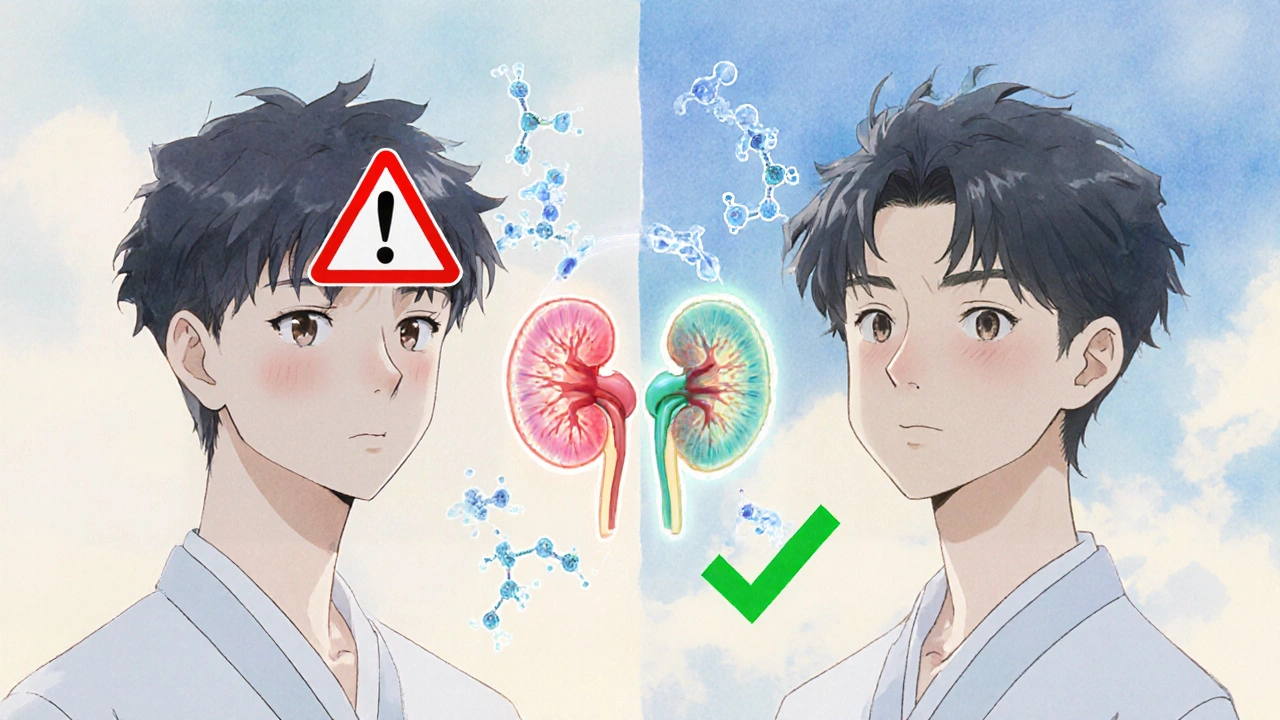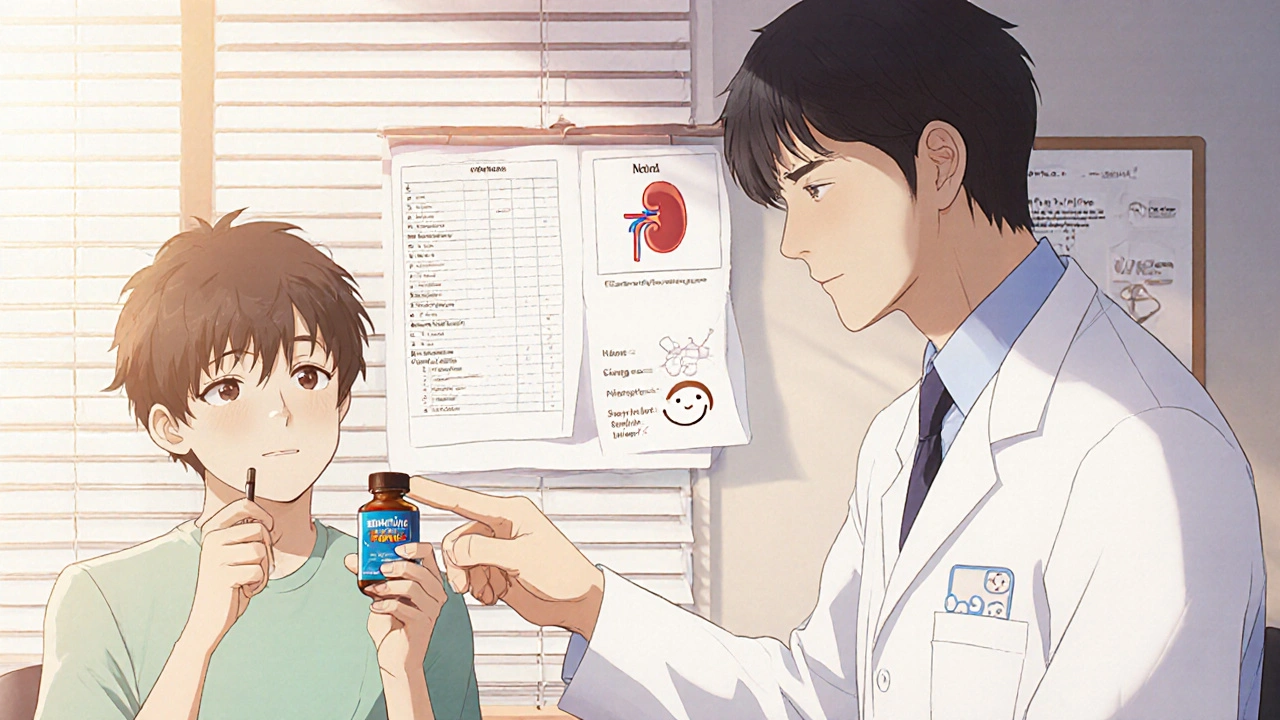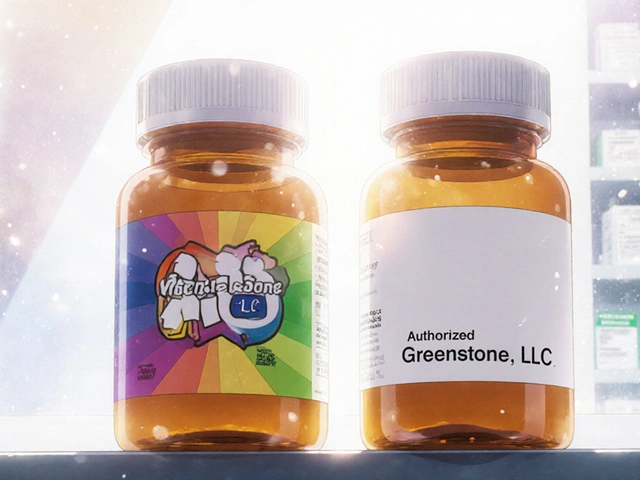Creatine-Induced Creatinine Calculator
Estimate Creatinine Impact
This tool helps you understand how creatine supplementation may affect your blood creatinine levels and kidney function tests.
Results will appear here...
When you take creatine, your body turns some of it into creatinine - a waste product your kidneys filter out. That’s normal. But here’s the problem: creatine makes your blood creatinine levels go up. And if your doctor only looks at that number, they might think your kidneys are failing - even if they’re working perfectly.
Why Creatine Throws Off Kidney Tests
Creatine monohydrate is the most studied supplement in sports science. Millions use it to build strength, recover faster, and boost performance. But every gram you take eventually becomes creatinine. Healthy adults on a standard dose (3-5 grams daily) can see their serum creatinine jump by 10-30%. That’s not kidney damage. That’s chemistry. The issue? Doctors rely on serum creatinine to calculate eGFR - the go-to number for kidney health. If your eGFR drops from 95 to 78 because of creatine, you might be labeled with stage 2 chronic kidney disease. You’ll get referred to a specialist, ordered for ultrasounds, maybe even put on medication you don’t need. All because a supplement changed a lab value. This isn’t theoretical. On Reddit’s r/kidneydisease forum, users report being misdiagnosed after starting creatine. One person saw their eGFR fall to 78 - then jumped back to 95 after stopping. No symptoms. No kidney trouble. Just a false alarm.What Really Shows Kidney Damage?
True kidney problems don’t just raise creatinine. They mess with multiple systems. Look for these signs:- High blood urea nitrogen (BUN)
- Protein in urine (proteinuria)
- Abnormal electrolytes (potassium, sodium, bicarbonate)
- Low urine output or swelling
What If You’re on Kidney Disease Medications?
This gets more complicated if you’re already managing kidney disease. Common meds like ACE inhibitors (lisinopril), ARBs (losartan), or NSAIDs (ibuprofen) can stress the kidneys. Some doctors advise against creatine in these cases - not because it’s proven harmful, but because the data is limited. There’s one case report from 2011 where a person on 3 grams of creatine daily developed acute tubular necrosis. But that’s an outlier. No other studies have replicated it. Still, if you’re on nephrotoxic drugs, your kidneys are already under pressure. Adding creatine might not be worth the risk - even if the chance of harm is tiny. The National Kidney Foundation says: “Creatine supplements should not be used in people with chronic renal disease or using potentially nephrotoxic medications.” It’s not a blanket ban. It’s a caution.
How to Monitor Your Kidneys Correctly
If you’re taking creatine and want to track kidney health, don’t rely on serum creatinine alone. Here’s what works:- Start with a baseline - Get your creatinine, eGFR, and BUN tested before starting creatine.
- Use cystatin C - This is a better marker. It’s not affected by creatine. The CKD-EPI CysC equation gives a more accurate eGFR for supplement users. Studies show 95% correlation with real kidney function.
- Check 24-hour urine creatinine clearance - If cystatin C isn’t available, this test measures how much creatinine your kidneys actually clear. Creatine users often have normal clearance, even with high blood levels.
- Ask your doctor to check for protein in urine - No protein? That’s a good sign.
- Don’t panic over a single creatinine spike - Wait 2-4 weeks after stopping creatine to retest. Levels usually drop back to normal.
What About “Kidney-Safe” Creatine?
Some brands market “kidney-friendly” or “low-creatinine” creatine. They claim to be safer. But ConsumerLab.com tested these in 2024. They found no difference in creatinine output. The product still breaks down into creatinine the same way. These labels are marketing - not science. Stick with plain creatine monohydrate. It’s the most studied, cheapest, and most effective form. Avoid blends with added stimulants, caffeine, or herbal extracts - those are the real risks.
What Do Experts Really Say?
UCLA Health says: “Long-term use of creatine does not harm kidney function in healthy adults.” The American College of Sports Medicine agrees - but says to test kidney function before starting if you have risk factors. Nephrologists in Chile reviewed over 50 studies and concluded: “Creatine supplements are safe and do not cause renal disease.” But they also warn: “Don’t use it if you already have kidney disease.” The bottom line? Creatine isn’t dangerous for healthy people. But it’s a wildcard for kidney tests. If you’re healthy, active, and monitoring properly - you’re fine. If you have kidney disease or take nephrotoxic meds, talk to your doctor first. Don’t assume it’s safe. Don’t assume it’s dangerous. Just be informed.What Should You Do Next?
If you’re thinking about starting creatine:- Get a baseline blood test: creatinine, eGFR, BUN, cystatin C (if possible).
- Start with 3-5 grams daily. No loading phase needed.
- Drink enough water - at least 2 liters a day.
- Tell your doctor you’re taking it - even if they don’t ask.
- Re-test in 3 months using cystatin C or 24-hour urine clearance.
- Don’t stop your meds. Don’t panic.
- Ask for a cystatin C test.
- Ask for a 24-hour urine collection.
- Stop creatine for 4 weeks and retest. See if numbers drop.
Frequently Asked Questions
Does creatine cause kidney damage?
No, creatine does not cause kidney damage in healthy people. Multiple studies, including a 2024 Mendelian randomization analysis, show no causal link between creatine use and kidney disease. Elevated creatinine levels are a normal metabolic side effect, not a sign of harm.
Can I take creatine if I have early-stage kidney disease?
The National Kidney Foundation advises against it. While creatine itself isn’t proven to worsen kidney disease, your kidneys are already under stress. Adding any substance that increases metabolic load - even if harmless - carries unknown risk. Always consult your nephrologist before starting any supplement.
Why do my blood tests show high creatinine when I take creatine?
Creatine breaks down into creatinine at a rate of about 1.7% per day. When you supplement, you’re adding extra creatine - so your body makes more creatinine. This raises blood levels by 10-30%, but your kidneys are still filtering waste normally. It’s a lab artifact, not a health problem.
Should I stop creatine before a kidney blood test?
If you’re being tested for kidney function and you take creatine, stop it for 3-4 weeks before the test. Creatinine levels usually return to baseline within a month. This avoids false positives. If you can’t stop, ask for a cystatin C test instead - it’s unaffected by creatine.
What’s the best way to monitor kidney health while taking creatine?
Use cystatin C-based eGFR (CKD-EPI CysC) instead of creatinine-based eGFR. If cystatin C isn’t available, a 24-hour urine creatinine clearance test gives a more accurate picture of kidney filtration. Always check for protein in urine and blood urea nitrogen - normal results mean your kidneys are working fine.







Comments
Alex Harrison
I started creatine last year and my doc almost flagged me for kidney issues. I had to explain it was the supplement, not my kidneys. He didn’t know the difference between elevated creatinine and actual damage. Glad someone finally laid this out clearly.
Jay Wallace
Oh wow, so now we’re supposed to trust some random guy on the internet over a lab value? I mean, if your kidneys are failing, the numbers don’t lie. You think your body’s just ‘faking’ it? That’s not medicine, that’s wishful thinking.
Alyssa Fisher
This is such an important post. It’s not just about creatine-it’s about how medicine often treats numbers like truth, instead of seeing them as clues. The body doesn’t communicate in lab reports. It communicates in symptoms, patterns, context. And we’re losing that. I’m glad someone’s reminding us to look deeper.
Alyssa Salazar
Let’s be real-cystatin C is the gold standard, but 90% of primary care docs don’t even know what it is. And if you’re not a health professional, good luck getting them to order it. The system is broken. Creatine isn’t the problem. The lack of education is. I’ve had to fight for this test twice. Don’t let your doctor guess-demand cystatin C. Period.
Beth Banham
I’ve been on creatine for 5 years. Never had an issue. My doctor never asked. I didn’t know to tell him. This post made me realize I should’ve spoken up sooner. Thanks for the clarity. I’ll get cystatin C next checkup.
Brierly Davis
Bro, if you’re lifting and taking creatine, you’re already ahead of 90% of the population. Don’t let a lab number scare you. Get cystatin C, drink water, and keep crushing it. Your kidneys are fine. Your ego might be the only thing that needs checking.
Amber O'Sullivan
Why are we even talking about this? If you’re healthy and not on meds you’re fine. If you’re sick don’t take it. End of story. Stop overcomplicating things
Jim Oliver
So you’re telling me… people are getting misdiagnosed because they didn’t read a Reddit post? You’re not a doctor. You’re not a nephrologist. You’re just… a guy who takes supplements. Why should anyone trust this? The fact that you think this is a ‘problem’ says more about you than the science.
William Priest
Anyone who doesn’t know the difference between creatinine and creatine shouldn’t be allowed near a gym. Or a blood test. Or a keyboard. This is basic biochemistry 101. If you’re confused, maybe don’t self-prescribe supplements. Just a thought.
Ryan Masuga
Hey, I was one of those people who got scared after my eGFR dropped. I stopped creatine, waited a month, retested, and it bounced back. I didn’t know cystatin C existed until I found this thread. Seriously, thank you. I’m going to share this with my gym buddies. They need to hear this.
Jennifer Bedrosian
OMG I JUST HAD A KIDNEY SCARE LAST WEEK AND THEY WERE GONNA SEND ME TO A SPECIALIST AND I WAS CRYING AND NOW I REALIZE IT WAS JUST CREATINE I’M SO RELIEVED
Lashonda Rene
I’m not a doctor or anything but I just think it’s cool how the body works, you know? Like, your kidneys are doing their job, but your supplement is just making extra junk that looks like a problem. It’s like your car’s exhaust is smoke but the engine’s fine. I just wish more people knew that. I’ve been taking creatine for years and I never thought about this until now. Thanks for explaining it so simply.
Andy Slack
Good post. I’ve been taking creatine for 7 years. No issues. I just started asking my doctor for cystatin C last year. They were surprised I even knew what it was. You’re not weird for knowing this stuff. You’re just ahead of the curve.